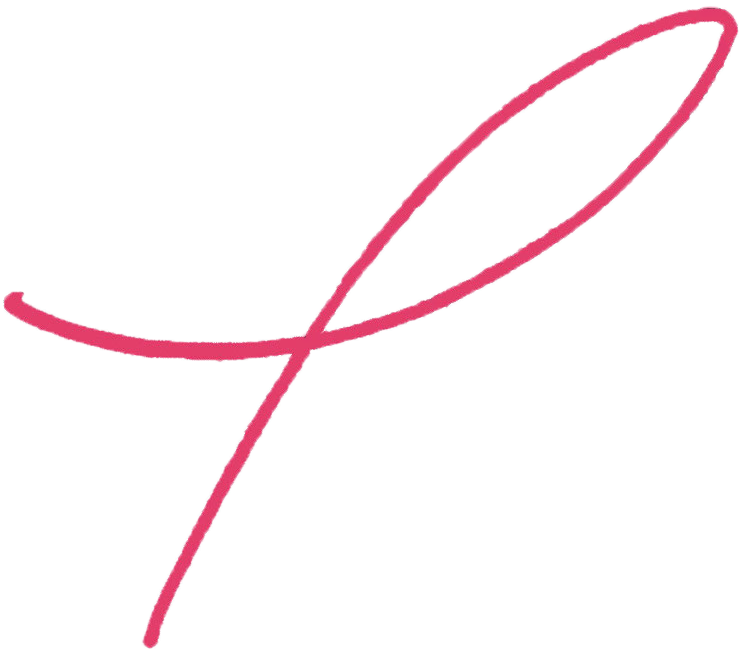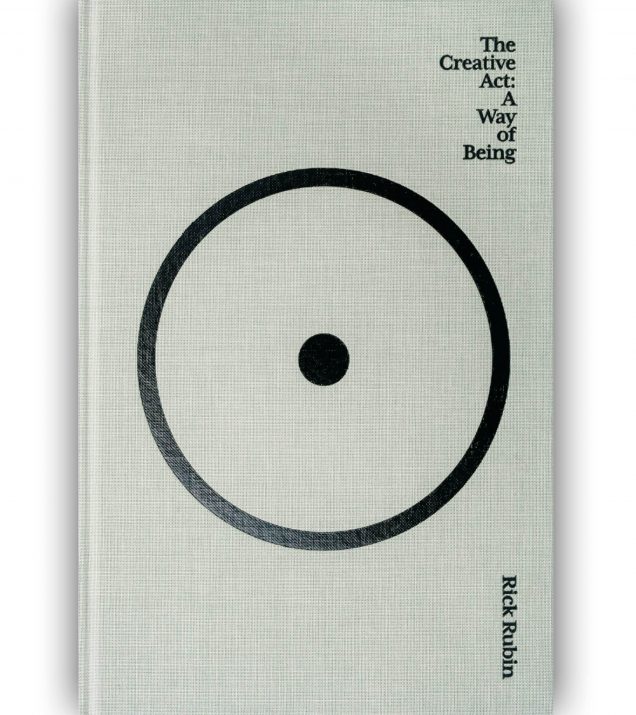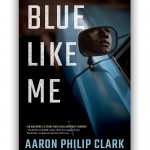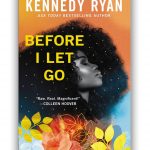Nothing in this book is known to be true. It’s a reflection on what I’ve noticed. Not facts, so much as thoughts. Some ideas may resonate. Others may not. A few may awaken an inner knowing you forgot you had. Use what’s helpful. Let go of the rest.
—Rick Rubin in Note To The Listener
I don’t recall where I first heard about Rick Rubin’s latest release, ☛THE CREATIVE ACT: A WAY OF BEING. I thought it was listening to the nine-time Grammy-winning producer on the On Being with Krista Tippett podcast. It wasn’t. I do know that as someone who’s currently reconciling my relationship with my own creativity, my craft, my writing… my art if you will, this book not only resonated with me, it found me. I’d recently signed up for screenwriter Felicia Pride’s The 21-Day Creative Comeback Challenge to exorcise my writing resentment and re-establish my writing routine and it was actually during the challenge that I’d heard about Rubin’s book. I immediately clicked on my local library app to access the audiobook, only to discover that I was 9th in line to borrow it. In the meantime, I continued on with my Creative Comeback assignments as well as my Morning Pages—“a daily writing ritual of three pages of stream-of-conscious”—per Julia Cameron’s ☛THE ARTIST’S WAY—the classic go-to manual when artists have neglected their craft, are in a funk or in need of some inspiration.
What you make doesn’t have to be witnessed, sold, or encased in glass for it to be a work of art.
—Rick Rubin in Everyone Is A Creator
Finally, it was my turn to listen to The Creative Act: A Way Of Being. So many gems were dropped within the first hour that I restarted the audiobook to take notes and write this post. Rubin reminds us that making art is not a competitive act and that self-doubt is “there to serve us.” When he says that people who “choose to do art are sometimes the most vulnerable,” it reminds me of when singer Erykah Badu declares, “Now keep in mind that I’m an artist and I’m sensitive about my shit,” on the intro of her hit “Tyrone.” Later, Rubin goes on to suggest that “if a creator is so afraid of judgement that they’re unable to move forward, it might be that their desire to share the work isn’t as strong as their desire to protect themselves.” Ouch! While that truth bomb may sting a bit, the salve he offers in suggesting that “their temperament might serve a different pursuit” and that “this path is not for everyone” is somewhat soothing. Ok, more like sobering. One of my favorite points that the co-founder of Def Jam Recordings makes is that, “this path is not an obligation to fulfill just because someone has a talent or skill.” Yessss Rick! Sometimes, pursuing a passion as a job or career dilutes the joy and kills the fun. Personally speaking, that’s cocktail-making and bartending for me. Enjoy it when I’m in the mood, but it’s labor intensive. Flattered when I’m asked to do it at parties, but trust me, I put way more love into it and my passion is a lot more obvious and infectious when I volunteer. Balancing spirits and pleasing palates is so much more fun and playful for me when I choose to do it. Oh, and Rubin, like Julia Cameron, encourages artists to prioritize playtime.
Living life as an artist is a practice. You’re either engaging in the practice or you’re not.
—Rick Rubin in Practice
“We are blessed that we get to create,” the NYU alum reminds us. “It’s a privilege. We’re choosing it. If we’d rather not do it, let’s not do it.” Rubin insists that good habits create good art and that while it may sound counterintuitive, discipline and freedom go together and are necessary in order to have “a harmonious relationship with time… Managing your schedule and daily habits well is a necessary component to free up the practical and creative capacity to make great art.” Read that again, ya’ll.
Fellow creative Ramón Ariel De Los Santos enjoying a glass of wine and The Creative Act. Happy Belated Birthday Ramon!
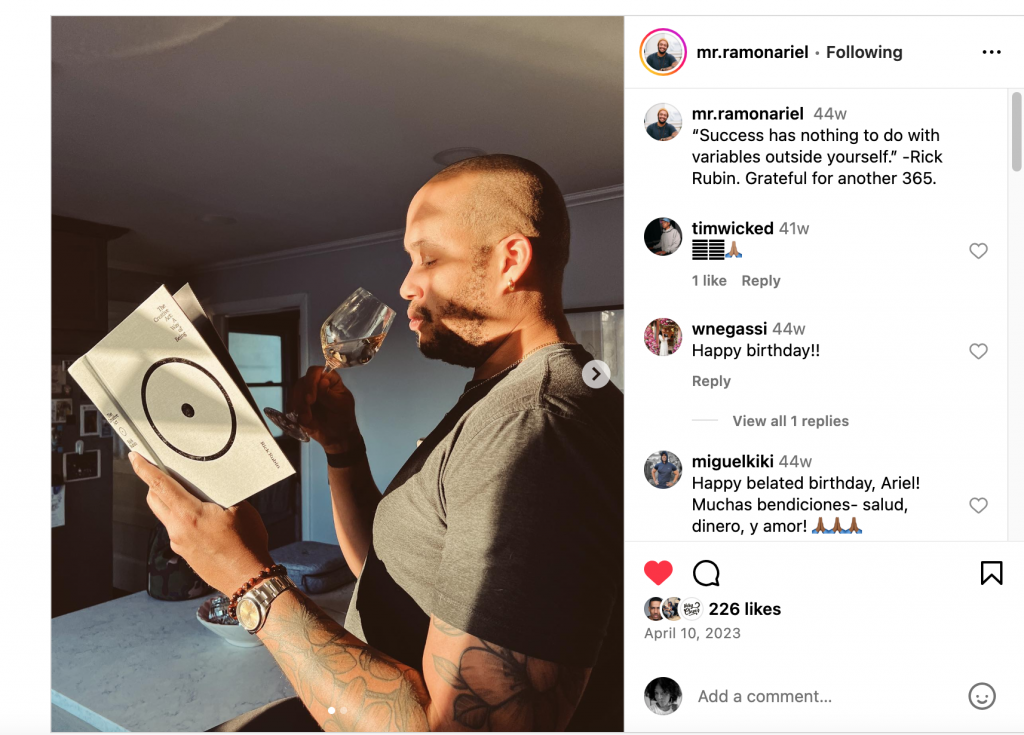
Oops! Ramon’s Instagram account is private. So I got his permission to share his post. 🙏🏾
The more you reduce your daily life maintenance tasks, the greater the bandwidth available for creative decisions… Limit your practical choices to free your creative imaginations.
—Rick Rubin in Habits
One of the best pieces of advice that the 60-year-old producer shares is to “create an easily achievable schedule to start with… The goal is to commit to a structure that can take on a life of its own instead of creating only when the mood strikes or to start each day with the question how or when you’re going to work on your art. Put the decision-making into the work not into when to work.” Whew! That’s a whole word because Lord knows I’ve hindered myself by getting overwhelmed with how and when I’m going to squeeze in writing and ideating time instead of simply scheduling time for both and sticking to it.
Success occurs in the privacy of the soul… Success has nothing to do with variables outside yourself.
—Rick Rubin in Success
According to Rubin, who’s made hit songs for Jay-Z, Adele, Run-DMC and so many more, “Popular success is a poor barometer of work and worth.” I co-sign. Regardless of your profession or station in life, the earlier you define success for yourself, the happier, more at peace and dare I say, the more successful you’ll be. Years ago, I heard Chef Tanya Holland politely check one of the Bravo Top Chef judges by explaining that everyone doesn’t experience the world the same way. Yasss Sis, Yes! Say 👏🏾that 👏🏾. So if everyone does not experience the world the same, then why on earth would anyone else’s success look or even define mine or yours? “Most variables are completely out of our control,” says Rubin.“The only ones we can control are doing our best work, sharing it, starting the next and not looking back.” Amen and Asé.
We create in service to art, not for what we can get from art.
—Rick Rubin in The Art Habit (Sangha)
Rubin’s most liberating declaration is that you may be asking too much of the art if you’re looking for it to support you. While Rubin understands the yearning to leave an unfilling job to support yourself through your passion, “however, if the choice is between making great art and supporting yourself, the art comes first. Consider another way of making a living.” Mic drop. Mouth drop! “Success is harder to come by when your life depends on it,” declares Rubin. “Art is an unstable career path for most. Financial reward comes in waves, if at all.” Oh dear artist, don’t despair! Rubin also says it’s fine to have a job to support your art habit. “Doing both is a better way of keeping the work pure. There are jobs that demand your time, but little else. You can protect the art you make by choosing an occupation that gives you the mental space to formulate and develop your creative vision of the world.”
It’s nourishing to be in a community of people who are enthusiastic about art who you can have long discussions with and with whom you can trade feedback on the work.
—Rick Rubin in The Art Habit (Sangha)
“You can also pursue an unrelated career that provides security while keeping art as your hobby,” Rubin continues. “A hobby that’s the most important thing in your life. All paths are of equal merit. Whatever you choose, it’s helpful to have fellow travelers around you. They don’t have to be like you, just like-minded in some way. Creativity is contagious. When we spend time with other artistic people, we absorb and exchange a way of thinking, a way of looking at the world. This group can be called a Sangha. Each person in this relationship begins seeing with a different imaginative eye. It doesn’t matter if their art form is the same or different than yours… Being part of an artistic community can be one of the great joys of life.”
In the end, the act of self-expression isn’t about you. Most who choose the artist path don’t have a choice. We feel compelled to engage as if by some primal instinct… We follow this instinct. To deny it is despiriting as if we’re in violation of nature.
—Rick Rubin in Why Make Art
Creatives folks will absolutely dig this book. While admittedly, I found some parts a lil’ hokey—like when Rubin’s doctor directed him to go immediately to the hospital for his ruptured appendix and Rubin instead went to the bookstore and happened upon a book that advised him against it. And today he still has his appendix.—Ummm. Say what now? Still, I highly recommend purchasing the hardcover to stick post-its in and refer back to from time to time. And what about non-creatives? Well according to Rubin, creativity is “a fundamental act of being human” and there’s no such thing.
The Creative Act: A Way Of Being Synopsis from Penguin Press:
Many famed music producers are known for a particular sound that has its day. Rick Rubin is known for something else: creating a space where artists of all different genres and traditions can hone in on who they really are and what they really offer. He has made a practice of helping people transcend their self-imposed expectations in order to reconnect with a state of innocence from which the surprising becomes inevitable. Over the years, as he has thought deeply about where creativity comes from and where it doesn’t, he has learned that being an artist isn’t about your specific output, it’s about your relationship to the world. Creativity has a place in everyone’s life, and everyone can make that place larger. In fact, there are few more important responsibilities.
The Creative Act is a beautiful and generous course of study that illuminates the path of the artist as a road we all can follow. It distills the wisdom gleaned from a lifetime’s work into a luminous reading experience that puts the power to create moments—and lifetimes—of exhilaration and transcendence within closer reach for all of us.
The Artist’s Way: A Spiritual Path To Higher Creativity 30th Anniversary Edition Synopsis per Tarcherperigee:
Since its first publication, The Artist’s Way phenomena has inspired the genius of Elizabeth Gilbert and millions of readers to embark on a creative journey and find a deeper connection to process and purpose. Julia Cameron’s novel approach guides readers in uncovering problems areas and pressure points that may be restricting their creative flow and offers techniques to free up any areas where they might be stuck, opening up opportunities for self-growth and self-discovery.
The program begins with Cameron’s most vital tools for creative recovery – The Morning Pages, a daily writing ritual of three pages of stream-of-conscious, and The Artist Date, a dedicated block of time to nurture your inner artist. From there, she shares hundreds of exercises, activities, and prompts to help readers thoroughly explore each chapter. She also offers guidance on starting a “Creative Cluster” of fellow artists who will support you in your creative endeavors.
A revolutionary program for personal renewal, The Artist’s Way will help get you back on track, rediscover your passions, and take the steps you need to change your life.
